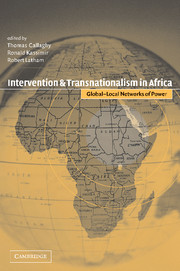Book contents
- Frontmatter
- Contents
- List of contributors
- Preface
- List of abbreviations
- 1 Introduction: transboundary formations, intervention, order, and authority
- Part I Historical dimensions and intellectual context
- Part II Theoretical frameworks
- 4 Identifying the contours of transboundary political life
- 5 Producing local politics: governance, representation, and non-state organizations in Africa
- Part III Transboundary networks, international institutions, states, and civil societies
- Part IV Political economies of violence and authority
- Part V Conclusion
- References
- Index
5 - Producing local politics: governance, representation, and non-state organizations in Africa
Published online by Cambridge University Press: 18 December 2009
- Frontmatter
- Contents
- List of contributors
- Preface
- List of abbreviations
- 1 Introduction: transboundary formations, intervention, order, and authority
- Part I Historical dimensions and intellectual context
- Part II Theoretical frameworks
- 4 Identifying the contours of transboundary political life
- 5 Producing local politics: governance, representation, and non-state organizations in Africa
- Part III Transboundary networks, international institutions, states, and civil societies
- Part IV Political economies of violence and authority
- Part V Conclusion
- References
- Index
Summary
The representative is, typically, both special pleader and judge, an agent of his locality as well as a governor of the nation. His duty is to pursue both local and national interest, the one because he is a representative, the other because his job as representative is governing the nation. That dual task is difficult, but it is neither practically nor theoretically impossible.
(Pitkin 1967: 218)… practices of government are, on the one hand, multifarious and concern many kinds of people: the head of a family, the superior of a convent, the teacher or tutor of a child or pupil; so that there are several forms of government among which the prince's relation to his state is only one particular mode; while, on the other hand, all these other kinds of government are internal to the state or society. It is within the state that the father will rule the family, the superior the convent, etc. Thus, we find at once a plurality of forms of government and their immanence to the state …
(Foucault 1991: 91)Introduction
In the first quotation above, Hanna Pitkin writes of the dual role of politicians representing a locality to the political center. She also hints at the potential tensions between the tasks of “representing” and “governing.” In this chapter, I explore this tension, but shift the analytical lens from the state and legislators to non-state organizations and their leaders. These leaders also make representational claims on behalf of their members and beneficiaries.
- Type
- Chapter
- Information
- Intervention and Transnationalism in AfricaGlobal-Local Networks of Power, pp. 93 - 112Publisher: Cambridge University PressPrint publication year: 2001
- 8
- Cited by



